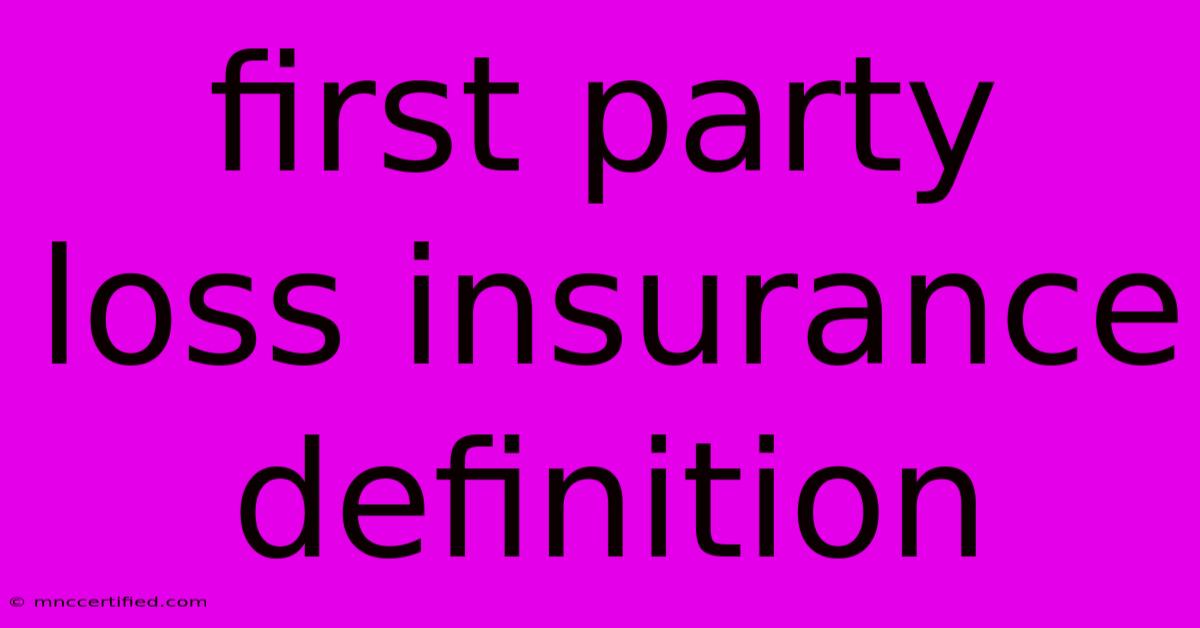First Party Loss Insurance Definition

Table of Contents
Understanding First-Party Loss Insurance: Protecting Your Assets
In the unpredictable world of risks and uncertainties, insurance plays a crucial role in providing financial security. Among the various types of insurance available, first-party loss insurance stands out as a vital protection for your own assets.
This article delves into the definition, key elements, and benefits of first-party loss insurance, helping you understand how it safeguards your interests.
What is First-Party Loss Insurance?
First-party loss insurance, as the name suggests, covers losses you experience to your own property or possessions. It focuses on protecting you as the insured party from financial hardship resulting from damage or destruction of your assets.
Think of it as a safety net that catches you when unforeseen events strike, such as:
- Fire: A fire damaging your house or belongings.
- Flood: Water damage caused by flooding.
- Windstorm: Damage caused by strong winds, hail, or tornadoes.
- Theft: Loss of property due to theft or burglary.
Key Elements of First-Party Loss Insurance:
- Insured Peril: The specific event or risk covered by the policy. This could include fire, flood, theft, or other perils.
- Insured Property: The assets covered by the policy, such as your house, car, or personal belongings.
- Coverage Limits: The maximum amount the insurance company will pay for a covered loss.
- Deductible: The amount you pay out-of-pocket before the insurance company starts covering the remaining costs.
- Premium: The regular payments you make to maintain the insurance policy.
Benefits of First-Party Loss Insurance:
- Financial Protection: First-party loss insurance provides financial compensation to cover repairs, replacement costs, or other expenses related to covered losses. This ensures you don't face significant financial strain in the event of a disaster.
- Peace of Mind: Knowing you have insurance in place brings peace of mind, reducing stress and anxiety about potential losses.
- Legal Protection: First-party loss insurance can provide legal protection in case of disputes with other parties involved in a loss event.
- Reduced Financial Burden: By sharing the risk with the insurance company, you significantly reduce the financial burden associated with unexpected losses.
Types of First-Party Loss Insurance:
- Homeowners Insurance: Covers damage to your house and belongings from various perils.
- Renters Insurance: Protects your belongings in a rented property.
- Auto Insurance: Covers damage to your car and liability for accidents.
- Flood Insurance: Provides coverage for damage caused by flooding, which is often excluded in standard homeowners insurance policies.
Understanding the Importance of First-Party Loss Insurance:
In today's uncertain world, having adequate first-party loss insurance is crucial. It's an investment in your financial well-being, safeguarding your assets and providing peace of mind.
Remember to:
- Choose a reputable insurance company.
- Obtain a policy that adequately covers your needs and assets.
- Regularly review your coverage to ensure it still meets your requirements.
- Seek professional advice from an insurance agent to make informed decisions.
By understanding the importance of first-party loss insurance and taking proactive steps to protect your assets, you can navigate life's unforeseen events with greater financial security.

Thank you for visiting our website wich cover about First Party Loss Insurance Definition. We hope the information provided has been useful to you. Feel free to contact us if you have any questions or need further assistance. See you next time and dont miss to bookmark.
Featured Posts
-
Is Neurofeedback Covered By Insurance
Nov 10, 2024
-
What Is Trailer Interchange Insurance
Nov 10, 2024
-
What Insurance Does Clear Choice Take
Nov 10, 2024
-
Shared And Layered Property Insurance
Nov 10, 2024
-
King Leads Nation In Silence On Remembrance Sunday
Nov 10, 2024